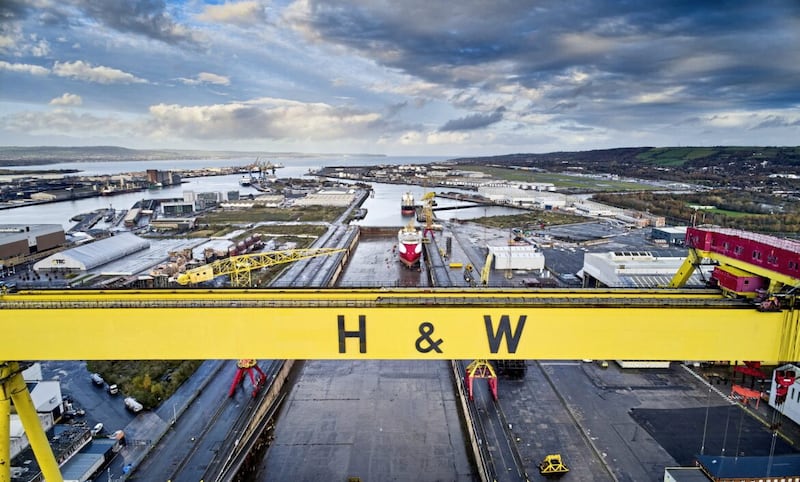More than 20 companies have expressed an interest in buying into the shipyard business of the crisis-hit Harland & Wolff, the union Unite has said.
The London-listed parent group of the Belfast shipyard is to be placed into administration this week, marking the second collapse of the business in five years.
The loss-making company was plunged into crisis in July when the UK Government rejected its bid for a £200 million loan guarantee.
Harland & Wolff had been trying to refinance a high interest loan from New York lender Riverstone Credit Partners. That loan facility now stands at around $140m (£106m).
In a trading update on Monday, the board of Harland & Wolff Group Holdings said the company is “insolvent on a balance sheet basis”, with the imminent collapse meaning shareholders will lose their investment.
Between 50 and 60 redundancies immediate redundancies are expected in “non-core” parts of the business.
The company warned that more job losses may be necessary across its workforce of 1,300.
The process to appoint administrators from Teneo is underway.
But the group’s four shipyards and its Islandmagee gas storage project will escape the administration process, with potential buyers being lined by Rothschild & Co.
Alongside its flagship Belfast shipyard, Harland & Wolff owns the Appledore shipyard in Devon and the Arnish and Methil yards in Scotland.
- Harland & Wolff prepare for administration but shipyards could remain open under new ownersOpens in new window
- Chief financial officer is latest top exec to jump ship from Harland & WolffOpens in new window
- Crisis at Harland & Wolff as UK government rejects £200m loan guarantee and CEO steps asideOpens in new window
The deadline for the first round of bidding is believed to be Wednesday.
Harland & Wolff’s board said a number of parties have expressed an interest in acquiring some or all of the group’s subsidiaries.
Unite said it understands that more than 20 companies have shown an interest in either purchasing all or part of the company or providing an injection of investment.
But the union’s regional secretary, Susan Fitzgerald, said “It is vital that the right buyer is found, failing that the government should be prepared to intervene.”
The union, which was involved in the 2019 campaign to save the shipyard, said its preferred option is to find a single buyer, with a history of shipbuilding for all four yards “rather than a private equity outfit looking for a short-term profit”.

That campaign to save the shipyard was hailed a success, when London-based energy infrastructure firm InfraStrata bought it out of administration for £6m.
Despite the Belfast shipyard having just 79 staff at the time of purchase and a new owner with no recognised pedigree for shipbuilding, InfraStrata rebranded and embarked on a significant campaign to ramp up the business.
Its efforts proved successful in 2022, when it was included in a consortium awarded a £1.6 billion contract to build naval vessels for the Ministry of Defence (MoD).
That subcontract with Spain’s Navantia to build three fleet solid support (FSS) vessels is estimated to be worth around £750m and is potentially the biggest carrot for a new buyer.
But there have been questions over Harland & Wolff’s ability to access capital and its ability to deliver such a large contract.
- Government guarantee for Harland & Wolff posed too great a risk to taxpayer money - UK Business SecretaryOpens in new window
- Harland & Wolff seek £200m debt refinancing deal after reporting £70m lossOpens in new window
- Harland and Wolff formally sign £800m subcontract for naval shipbuildingOpens in new window
In a parliamentary defence committee hearing in January 2023, the senior MoD naval officer responsible for the FSS programme was grilled by the former Labour MP Kevan Jones, who raised questions over Harland & Wolff’s balance sheet.
Mr Jones asked Vice Admiral Paul Marshall if the Belfast shipyard had been used by a Navantia as “a poster in the window” to win the MoD contract.
He also raised a £55m minesweeping contract awarded to the Appledore shipyard, stating: “I just do not get my head around why alarm bells are not ringing about the financial position of Harland and Wolff to fulfil this contract.”
Harland & Wolff’s huge spending to ramp up the business resulted in pre-tax losses of £113m across 2022 and 2023.
In a bid to refinance its debts from commercial lenders, the company applied for a UK Export Finance Export Development Guarantee (EDG) on £200m of borrowing.

With no other avenues left, Harland & Wolff was forced to turn to Riverstone for a $25m emergency loan in July to keep the company going, with changes made to the leadership team.
The company said discussions remain active with several parties to secure interim funding to support the business whilst the Rothschild & Co sale process is ongoing.
Russell Downs, who was appointed chairman as part of the overhaul of leadership in July, said the group had faced a “very challenging time” due to historic losses and a failure to secure long-term financing.
He said: “It’s important to recognise that this is very difficult news for staff and will affect many within group.
“We will work to support our staff through this transition.
“We also know that it will be very unwelcome news for shareholders who have shown significant commitment to the business over the last five years.
“The board, the senior managers and rest of the team are committed to deliver the best outcome for the four yards and communities they serve to ensure their continued operation into the long term under new ownership.
“Unfortunately, extremely difficult decisions have had to be taken to preserve the future of our yards.
“Despite the recent challenges, the four yards have a strong capability, under new ownership and with the continuing support of their customers, to deliver UK-based ship building and leading UK-based renewables employing over 1,300 committed personnel.
“It’s critical that the business comes through its financial troubles to secure an enduring legacy worthy of its name and its past for the benefit of the UK as a whole and its communities in particular.”





